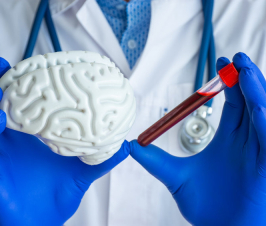Development of the Microbiome Occurs Before Birth
 Development of the microbiome starts long before any human takes its first breath. The microbiome is as unique to an individual as a fingerprint! Even identical twins do not have the same one! The Gut is called the second brain; however, its development is far more integral in the fetus than the actual brain.
Development of the microbiome starts long before any human takes its first breath. The microbiome is as unique to an individual as a fingerprint! Even identical twins do not have the same one! The Gut is called the second brain; however, its development is far more integral in the fetus than the actual brain.
The immune system begins to develop very early in gestation. Stem cells, which are undifferentiated developing cells, that will over time, become the major cells of a human’s immune system. The development of specific receptors in the gut and immune system will be signaled to develop in early pregnancy. T lymphocytes, a major component in the immune system, are a type of lymphocyte (a subtype of white blood cell) that plays a significant role in cell-mediated immunity. T Lymphocytes start to leave the fetal thymus after differentiation, from about 14 weeks gestation and begin to populate the developing immune system. The Mother’s immune system will signal the baby’s immune system as to how the immune cells and microbiome should lay out based on her immune system, diet, stress, sleep and maternal stores.
Th2 Rich Environment
In an ideal scenario, babies develop in a Th2 rich environment and born with his or her chemical profile shifted towards Th2. Th2 cells are the cells of the immune system that produce immune responses against parasites of all types that live OUTSIDE a cell. If mother’s immune system is a properly balanced immune profile; then, her healthy baby at birth, will have a Th1/Th2 profile that is heavilyshifted towards Th2to protect the baby against anything that could “attack” it from outside a cell. Th2 cells help regulate humoral immunity which help deal with pathogens that present a threat outside of cells.
Th1 Cells Respond Against Intracellular Parasites
Th1 cells are another component of the immune system that generate responses against intracellular parasites such as bacteria and viruses. So, a Th1 response offers protection to pathogens that pose a threat to get INSIDE a cell (and a Th2 response offers protection against pathogens outside of cells) the baby then will trigger his/her increase in Th1 when travelling through the birth canal and picking up all mom’s beneficial flora on its earth side voyage. This is the beginning of the development of the baby’s own unique microbiome.
Mom’s Microbiome Makes a Big Impact from Birth
So, if mom has a methylation defect, SIBO, an autoimmune condition, or takes certain pharmaceutical medications that disorder her microbiome, these misdirected signals can be sent to the baby and trigger an inflammatory response during fetal development. During infancy and childhood when a baby encounters viruses and bacteria help build this Th1 profile to properly enhance the child’s naturally building immune system.
What Happens When Immunity is Skewed Toward Th2 at Birth?
When immunity is skewed toward a Th2 profile at birth, because immunities may not have passed through the placenta and/or the baby does not have contact or exposure to the flora in the birth canal, inflammation can begin. Exposure to inflammatory modulators in early infancy, can trigger the immune system in to “over-reactive” Th2 or minimally reactive Th1 immunities. Leading to an increased level of Th2, which is associated with eczema, allergies, and asthma!Incidence of Allergic asthma, effects more than 10% of individuals in industrialized nations! that number climbs each and every year!
“An imbalance of Th2 over Th1 immunity is associated with allergic disease and hypersensitivity and mood changes including depression”
So, when discussing healing of the microbiome, we now know that the development of the unique landscape of the “second brain” develops long before any human takes it first breath. The microbiome is a complex network of bacteria designed to protect our individual and insure survival. Any aberration to the specific, mechanistic lay-down of these organisms in our microbiome can set an individual up for inflammation. If we manipulate the immune system in a way that artificially pushes Th2 toward inflammation, immunity is NOT achieved, and the immune system and microbiome will change in makeup to create further inflammation. The good news is the human form is abundantly resilient. Within days the microbiome can also change for the better.
*Balancing the immune system with proper diet, such as a PALEO type diet full of essential minerals and probiotics from natural (organic) sources of animal protein and a wide variety of vegetables, fruits and nuts, helps the body to digest nutrient dense food and utilize minerals optimally. Minerals are cofactors in many of the vital processes of the body.
*Removal of toxins from the environment, such as minimizing exposure to EMFs, pesticides, chemicals, and GMOs, all which have been shown by scientific study to imbalance the immune system, damage the microbiome and negatively impact the layout of the microbiome in a developing fetus.
* Let your kids fever. Beneficial immunity in childhood is a fever. National Institute of Allergy and Infectious Diseases (NIAID), found that infants who experience fevers before their first birthday are less likely to develop eczema. Fevers are commonly a sign of a Th1 response, with increased fevers (increased Th1) children were less likely to develop allergies.
*Beneficial probiotics such as bacillus strains have been shown to decrease pathogens in the gut and eliminate toxic byproducts like ammonia that allow harmful bacteria to proliferate. Probiotics are key in laying down and maintaining proper gut health which translates into a disease-free state.
Sources
- http://www.sciencedaily.com/releases/2004/02/040210080041.htm
- http://www.reuters.com/article/healthNews/idUSTRE5236HS20090304
- J Clin Invest, January 1999, Volume 103, Number 2, 175-183
- http://www.jci.org/articles/view/5155/version/1
- Vaccine strategies: targeting helper T cell responses. Golding B; Scott DE; Ann NY Acad Sci, 754(-VI-):126-37 1995 May 31- http://www.ncbi.nlm.nih.gov/pubmed/7625646
Image Copyright: <a href=’https://www.123rf.com/profile_bowie15′>bowie15 / 123RF Stock Photo</a>
 Dr. Kendra Becker is one truly integrated physician practicing for 10 years; She is Connecticut’s only “4A Specialist” (asthma, autism, allergies, atopy/eczema). She holds an ND degree from University of Bridgeport and MS, APRN from Sacred Heart University. She is board certified in both areas. Her specialties include MTHFR, fertility and treatment of “the 4As” (asthma, autism, allergies, atopy/eczema). Dr. Becker focuses on primarily treating the pediatric population and their parents as well as using her own “Pre-Conception Health Care” protocol to improve pregnancy outcomes among her patient population. Dr. Becker is a member of Both PEDANP and ANCC, as well as holding certifications for Nutrigenomics, Epigenetics and Methylation. Dr. Becker is adjunct Faculty Yale School of Nursing. She was recently chosen as one of Connecticut’s “Top Naturopathic Doctors”.
Dr. Kendra Becker is one truly integrated physician practicing for 10 years; She is Connecticut’s only “4A Specialist” (asthma, autism, allergies, atopy/eczema). She holds an ND degree from University of Bridgeport and MS, APRN from Sacred Heart University. She is board certified in both areas. Her specialties include MTHFR, fertility and treatment of “the 4As” (asthma, autism, allergies, atopy/eczema). Dr. Becker focuses on primarily treating the pediatric population and their parents as well as using her own “Pre-Conception Health Care” protocol to improve pregnancy outcomes among her patient population. Dr. Becker is a member of Both PEDANP and ANCC, as well as holding certifications for Nutrigenomics, Epigenetics and Methylation. Dr. Becker is adjunct Faculty Yale School of Nursing. She was recently chosen as one of Connecticut’s “Top Naturopathic Doctors”.
Dr. Becker lectures on various topics throughout the nation, including elimination diets, vaccine education, methylation and fertility. She has made regular appearances on both local and national TV programs, featured as a specialist and expert in the areas of holistic medicine. Dr. Becker writes for an international publication and Dr. Becker is published her first book this fall, ”A Delicious Way to Heal the Gut” a healthy cook book to help families jump start special diets.

















